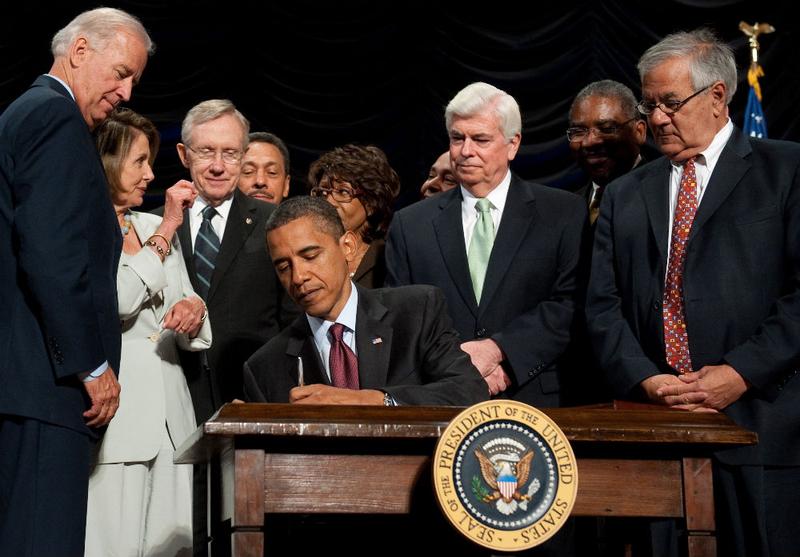
Welcome to Politics Bites, where every afternoon at It's A Free Country, we bring you the unmissable quotes from the morning's political conversations on WNYC. Today on the Brian Lehrer Show, Roben Farzad, senior writer for Bloomberg Businessweek, continues his weekly series this month looking at Obama administration economic programs. This week: Dodd Frank turns one-year-old.
Telling banks that “unless your business model depends on cutting corners or bilking your customers, you’ve got nothing to fear from reform”, President Obama signed the massive Dodd-Frank financial reform bill one year ago this week.
But one year in—did it work? Roben Farzad said the jury is still out.
This thing is way too massive and it’s way too in-progress for us to be able to look back and say with any amount of certainty that it’s been a success. But certainly it’s one of the more polarizing things out there in an already-polarized environment.
The bill – the full name is the Dodd-Frank Wall Street Reform and Consumer Protection Act – is dense. There are sixteen individual sections within the bill. The main two sides, though, are those named in the title – Wall Street reform and consumer protection.
One of the main tenets of the bill was to do away with the too-big-to-fail situation. Farzad said that so many of the struggling banks consolidated into even larger conglomerates, this particular attempt has been wildly unsuccessful.
I don’t want to yell fire in a crowded movie theater, but Bank of America is being confronted with these very questions… this financial stability oversight council which is supposed to intervene… has hardly been heard from… These firms are even too-bigGER-to-fail now.
The Volker rule says that if you are a bank that does business with the public, you cannot also be a bank that engages in the type of risky speculation that a hedge fund might take on. It was hotly disputed at the time and still has not been implemented. Farzad said it’s not that easy to make the switch.
The devil is in the details. Proprietary trading happens in all these other nooks and crannies on Wall Street.
Another controversial element of the bill is derivative reform, which requires certain trades go through a trading house. Farzad said this was absolutely necessary.
This at least ensures that qualified necessary participants out here... that they’re legitimate players, they’re not these fly by night people who are going to take on, you know, 50-to-one leverage, just to turn a buck or two overnight.
There are currently two dozen bills in Congress that seek to dismantle part of the Dodd-Frank Act, with business lobbyists spending more than $50 million this year alone to try to change the law. The agency charged with implementation has missed all of the deadlines thus far for implementation of the provisions in the Act. Farzad explained that there is a Catch-22 preventing progress, with the Consumer Financial Protection Agency finding it difficult to function without a leader, and Congress staunchly opposing the administration’s attempts to name a director.